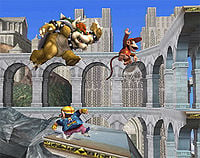Past Stages

Past Stages is the designation for returning stages in Super Smash Bros. Melee. In Super Smash Bros. Brawl, they are known as Melee Stages.
In Super Smash Bros. Melee[edit]
In Melee, three Past Stages were available. They are replicas of their Super Smash Bros. counterparts, complete with music and backgrounds. All of these stages must be unlocked, unlike in the original game. The stages also seem to be slightly larger in size than before. None of these stages are used in Classic Mode or All-Star Mode.
From Super Smash Bros.[edit]
In Super Smash Bros. Brawl[edit]
In Brawl, they are referred to as Melee Stages, as no stages originating from Smash 64 reappear. As a result, this makes Brawl the only game where stages from the first Smash Bros. do not appear. These stages now utilize the functions of My Music, like most stages in Brawl. According to the DOJO!!, the stages are arranged so the player can get one from each game world.[1] This turned out to mean each universe that was represented in the original game, all of which had multiple stages in Melee. Unlike the Past Stages of Melee, some Melee Stages have had minor edits (which are listed below), while aesthetically remaining largely the same as Melee. As in Melee, none of these stages are used in Classic Mode or All-Star Mode.
Changes in Super Smash Bros. Melee stages[edit]
|
Stage |
Availability |
Changes |
|---|---|---|
| Big Blue | Unlockable | Floating platforms and other airborne items except bumpers don't fly away with the stage. |
| Brinstar | Starter | Stronger acid. |
| Corneria | Starter | New sound effects for the flying Arwings and Wolfens, blasts from the Arwings and Wolfens no longer KO but still deal damage. |
| Green Greens | Unlockable | Bomb blocks have much more knockback, making it able to KO at low damage percentages. All three block columns in each side must now fill to the top in order to halt the dropping blocks for that side, rather than just one. |
| Jungle Japes | Unlockable | Characters can now swim in the river, but it will still carry them off-screen; Klaptraps have different properties. |
| Pokémon Stadium | Unlockable | Fireworks in the background look different, the windmill's platforms in the water stage are no longer pass-through, new sound effect from Pokémon Stadium 2 can be heard when the stage is changing. |
| Rainbow Cruise | Starter | Floating items like Party Balls no longer fly offscreen, characters can no longer jump through the donut lifts. |
| Temple | Starter | Edge near lowest platform can no longer be grabbed. |
| Onett | Starter | Warning sign when a car is approaching is much smaller and can hardly be seen, right edge of the roof on the building on the left can not be grabbed, hospital in the background has had its red cross removed, the blue house's roof has a small area on the sides where players cannot jump over, cars are much weaker though they can still damage the player. |
| Yoshi's Island | Starter | Reduced size. |
It should also be noted that most (if not all) of these stages are smaller compared to the characters than they were in Melee, possibly due to the character models being larger in order to provide more detail. Also, some of the music sounds slightly different than it did in Melee. Finally, the Pokémon Trainer gains platforms in the background.
In Super Smash Bros. 4 and Super Smash Bros. Ultimate[edit]
Returning stages no longer have any specific in-game name (though in Smash 4, they were referred to one time as Familiar Stages in the April 2014 Direct). In Smash 4, new and returning stages are freely mixed on the stage selection screens of both versions with no visual distinction, while in Ultimate there is a trivial distinction as stages are sorted in chronological order. In all of these games, returning stages can now be used in Classic Mode.
Trivia[edit]
- Somewhat notably, almost all non-DLC past stages across both versions of Smash 4 appeared in the directly-preceding game, Brawl, with Kongo Jungle 64 in for Wii U being the sole exception.
- Temple appears to be the only past stage in for Wii U to have received a significant graphical upgrade, possibly due to an intention to promote it for 8-Player Smash. During the 50-Fact Extravaganza video, it was presented alongside 8-Player Smash, The Great Cave Offensive, and Palutena's Temple in a segment about how the latter two stages were designed to show off the Wii U's then-new HD capabilities during 8-player battles.
References[edit]
| Stages in Super Smash Bros. | |
|---|---|
| Starter stages | Congo Jungle · Dream Land · Hyrule Castle · Peach's Castle · Planet Zebes · Saffron City · Sector Z · Yoshi's Island |
| Unlockable stage | Mushroom Kingdom |
| Stages in Super Smash Bros. Melee | |
|---|---|
| Starter stages | Brinstar · Corneria · Fountain of Dreams · Great Bay · Green Greens · Icicle Mountain · Jungle Japes · Kongo Jungle · Mushroom Kingdom · Mute City · Onett · Pokémon Stadium · Princess Peach's Castle · Rainbow Cruise · Temple · Venom · Yoshi's Island · Yoshi's Story |
| Unlockable stages | Battlefield · Big Blue · Brinstar Depths · Final Destination · Flat Zone · Fourside · Mushroom Kingdom II · Poké Floats |
| Dream Land · Kongo Jungle · Yoshi's Island | |